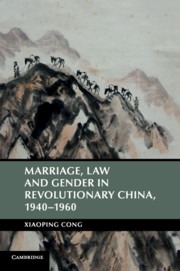Book contents
- Frontmatter
- Dedication
- Contents
- List of figures
- List of maps
- List of tables
- Acknowledgments
- Map
- Introduction
- Part I Locality, marriage practice, and women
- Part II Legal practice and new principle
- Part III Politics and gender in construction
- Epilogue: “Liu Qiao'er,” law, and zizhu : beyond 1960
- Bibliography
- Index
Introduction
Published online by Cambridge University Press: 05 September 2016
- Frontmatter
- Dedication
- Contents
- List of figures
- List of maps
- List of tables
- Acknowledgments
- Map
- Introduction
- Part I Locality, marriage practice, and women
- Part II Legal practice and new principle
- Part III Politics and gender in construction
- Epilogue: “Liu Qiao'er,” law, and zizhu : beyond 1960
- Bibliography
- Index
Summary
In 1950 a Ping opera (Pingju 评剧) play entitled Liu Qiao'er 刘巧儿 was presented on Beijing's stages to accompany the promulgation of the revolutionary new Chinese Marriage Law. It tells the story of a young woman, Liu Qiao'er, who lives in the Chinese revolutionary base area in the 1940s and resists a marriage arranged by her father. As a child Qiao'er was engaged to the son of the Zhao family, but she refuses this engagement because it is not her will and she wants to find her own marriage mate. Liu Qiao'er falls in love with a handsome young man she encounters in a meeting. Later she learns that he is her former fiancé. During this time her father arranges another engagement with an old man, a rich landlord. Her former fiancé's family then comes to the Liu residence and kidnaps Qiao'er for marriage. The county judge punishes the Zhaos for the kidnapping and also annuls Qiao'er's marriage to her lover, her former fiancé. Qiao'er bravely appeals to a higher authority, Prefect Ma, who has a better understanding of the revolutionary principle of marriage and thus reverses the judgment. With the support of the revolutionary government, Qiao'er is able to marry the man of her choice, and the story concludes happily.
This opera was later performed on the national stage and then adapted into a 1956 musical film that was shown throughout China. It is no exaggeration to claim that Liu Qiao'er influenced generations of youth from the 1950s to the 1960s. The most famous arioso was on everyone's lips:
In my childhood, it was arranged that I, Qiao'er,
Would marry a son of the Zhao family.
It was my parents’ decision, but we two did not know each other.
How could we be happy together?
…
In a meeting I met this man and liked him very much…
This time I want to choose my own marriage mate.
The arioso's melody and the story's image left a deep impression on my childhood memory because they were frequently presented at many celebratory occasions and workplace parties during the holidays. These artistic works not only created an image of Liu Qiao'er that encouraged women to fight against old marriage practices, but also promoted a new concept of “self-determination” (zizhu 自主) that inspired women to choose their own mate in marriage.
- Type
- Chapter
- Information
- Publisher: Cambridge University PressPrint publication year: 2016

